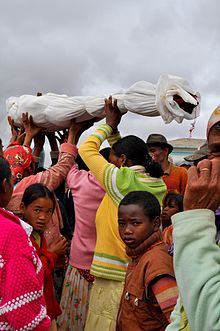Famadihana

Famadihana is a funerary tradition of the Malagasy people in Madagascar. During this ceremony, known as the turning of the bones, people bring forth the bodies of their ancestors from the family crypts and rewrap them in fresh cloth, then dance with the corpses around the tomb to live music.[1]
Famadihana appears to be a custom of somewhat recent origin, perhaps only since the 17th century in its present form, although it may be an adaptation of premodern double funeral customs from Southeast Asia. The custom is based upon a belief that the spirits of the dead finally join the world of the ancestors after the body's complete decomposition and appropriate ceremonies, which may take many years. In Madagascar this became a regular ritual usually once every seven years, and the custom brings together extended families in celebrations of kinship, sometimes even those with troubled relations.
The practice of Famadihana is on the decline due to the expense of silk shrouds and belief by some Malagasy that the practice is outdated. Early missionaries discouraged the practice and Evangelical Christian Malagasy have abandoned the practice in increasing numbers. The Catholic Church, however, no longer objects to the practice because it regards Famadihana as purely cultural rather than religious. As one Malagasy man explained to the BBC, "It's important because it's our way of respecting the dead. It is also a chance for the whole family, from across the country, to come together."[1][2]
